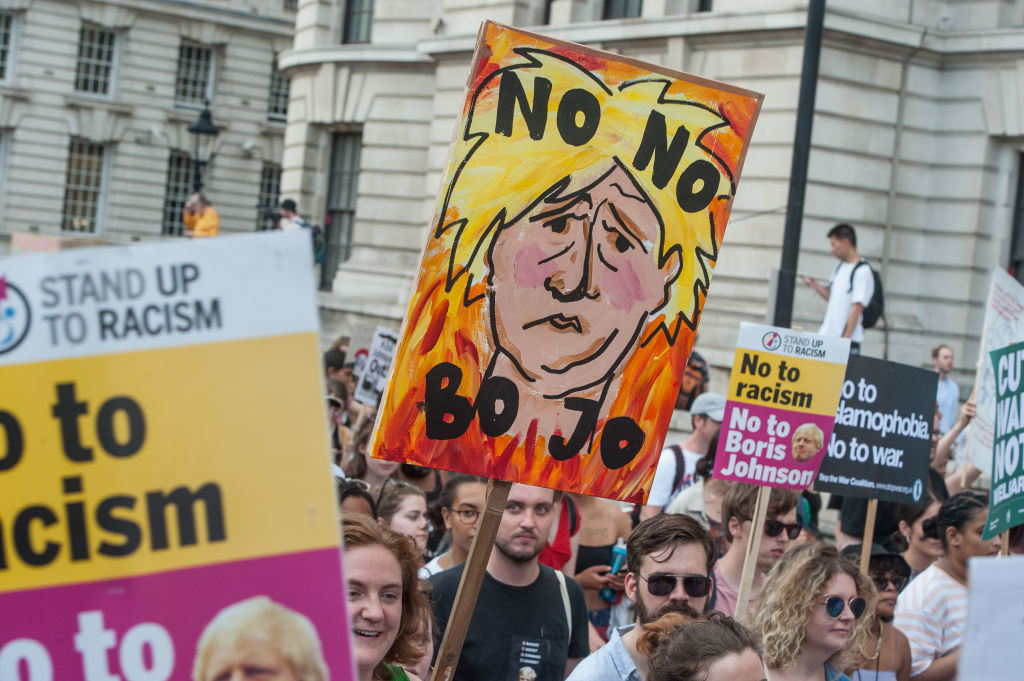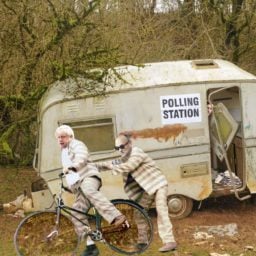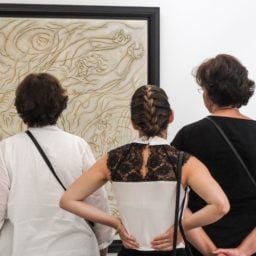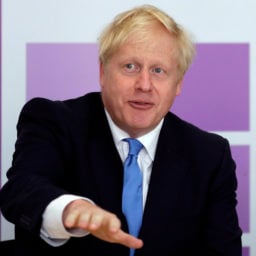As the UK’s new, combative prime minister, Boris Johnson, makes preparing for a no-deal Brexit his government’s “top priority,” arts and culture workers across the country are increasingly worried about the risk of Britain crashing out of the European Union on October 31. Others fear that a messy divorce, and a blame game about who is responsible, could result in a “Brexit cold war” between Britain and Europe.
“A no-deal Brexit could bring a disruptive situation that should be avoided by all means,” Aeneas Bastian, the director of the London- and Berlin-based Bastian Gallery, tells artnet News. “We need a mutually agreed exit treaty to ensure a smooth transition.”
If, as many fear, such a transition does not come, at least one artist, Bob and Roberta Smith (real name: Patrick Brill), is prepared to take to the streets. The artist says that if Johnson bypasses Parliament in order to push through a no-deal Brexit, he will join demonstrators outside Westminster, singing a protest song with his guitar and marching “with my banner and my paintbrush.”
Amid all this uncertainty and anxiety, the art world is working to prepare for a Johnson-led UK as best it can. Below, we explore four issues the art world must contend with under the new prime minister.
1. The Impact of a No-Deal Brexit
Frieze London and Frieze Masters take place in early October, and so will narrowly avoid clashing with an abrupt departure from Europe without a deal in place. The fair’s director, Victoria Siddall, says that over the past two years, Frieze has held roundtables for galleries and collectors in London to discuss Brexit. The major auction houses have similar task forces.
“We will continue to advocate on key issues on their behalf, such as the free circulation of art works in Europe, and the temporary exemption from import duty,” Siddall says. She stresses that the 2019 edition will be the “most global” edition ever staged, with galleries coming from 36 countries.
Also of concern are potential delays on the UK border with the European Union, and a lot more red tape, if there is no trade deal in place before October 31. The government has issued guidance for imports and exports in a no-deal scenario, advising those wishing to transport property across the border to be prepared to make customs declarations. International art dealers with spaces in London were on standby to move valuable works into the EU ahead of an earlier Brexit deadline. In March, Thaddeus Ropac said that his gallery was set to move works by Robert Rauschenberg, among others, from London to Paris as an emergency measure.
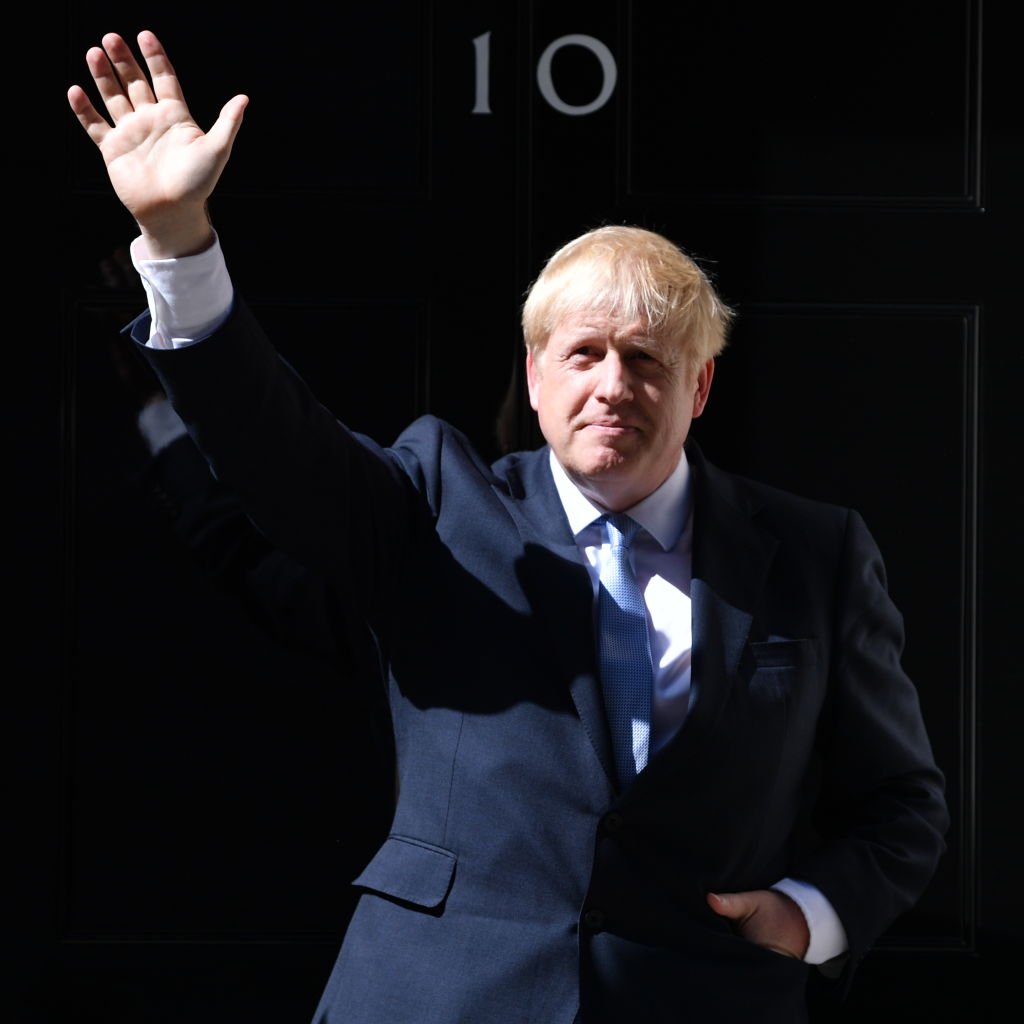
Boris Johnson waves from the door of Number 10, Downing Street. Photo by Jeff J Mitchell/Getty Images.
Tate’s trustees have also been working to mitigate the effect of a potential no-deal Brexit, which could scare off European lenders wary of having to pay an import tax when their works return home. The museum did not respond to a request about special measures in place for its Takis show at Tate Modern, which closes a week before the Halloween deadline.
2. The Arrival of Freeports
Johnson has raised eyebrows for his pledge to establish pilot freeports in the UK after the country leaves the EU. These are areas seen as independent for customs purposes, which are particularly appealing to collectors who wish to store art tax-free.
Speaking earlier this month, Johnson was enthusiastic about the idea of turning several cities into a “Singapore-style” tax-free zones, the Guardian reports, including Belfast, Teesside, Aberdeen, Peterhead, Bristol, Grimsby, Hull, and Liverpool.
Art dealer Aeneas Bastian says that the freeport proposal, which remains quite provisional, would offer an “undeniable advantage in a competitive global art market” and allow collectors to “keep works in limbo before they determine their final destination.“ The initiative might also come at an opportune time: the EU has vowed to crack down on existing freeports, with European Justice Commissioner Věra Jourová identifying them as “the new emerging threat” for money laundering, according to Politico.
3. Potentially Dwindling Arts Funding
In his cabinet reshuffle, Johnson appointed Nicky Morgan as the head of the culture ministry. Morgan is the fourth politician to occupy the role in the past three years. The former education secretary once discouraged students from pursuing the arts, arguing that they would be “held back” in life by doing so. She will be responsible for securing the best deal for culture in the budget, which may be an uphill battle after Johnson rapidly committed to vote-winning strategies like promising tax cuts for the wealthy and recruiting 20,000 new police, which alone has an estimated cost of around £1.1 billion ($1.4 billion).
Another black eye for arts funding comes via Brexit. A huge consequence of leaving the EU with no deal would be that arts in the UK will no longer receive funding from the bloc. According to research conducted for Arts Council England in the run-up to the Brexit vote, the EU contributes £40 million ($50 million) per year to the arts, museums, and creative industries in England alone. Around 1,385 projects received funding from the EU between 2007 and 2016.
4. No Freedom of Movement
While Johnson has promised with “absolute certainty” to guarantee the rights of the 3.2 million EU citizens currently living and working in the UK, the question remains as to how EU nationals hoping to come to the UK after Brexit will be treated. (Galleries and museums, of course, are among many industries that employ EU nationals.)
“Boris Johnson’s new prime ministership in the short term means the same uncertainty. And uncertainty is not a friend to the arts, as many of the investors and funders of art initiatives are in business and need certainty to create success,” Stacie McCormick, artist and founder of the Workshop Foundation, which supports emerging and midcareer artists with studio space in London, tells artnet News.
McCormick adds that her residency programs are specifically at risk of receiving fewer applicants from the EU “due to concerns on being eligible to work and stay in the UK.”
